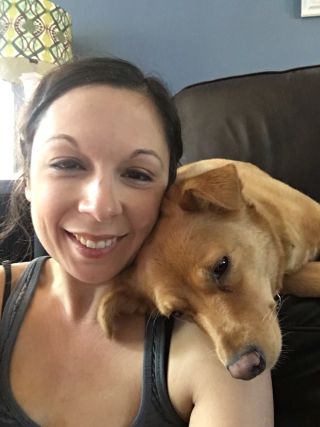Relationships
Inside the Human-Dog Love Affair
Dogs are seen as family, so their loss is especially painful.
Updated February 24, 2024 Reviewed by Devon Frye
Key points
- Most Americans own at least one pet, typically a dog.
- We love our pets, and often treat them as part of the family.
- Unfortunately, when we lose our pets, it can be devastating.
- But research suggests that they love us too.

My 12-year-old dog Charlotte died this week. We’ve had her since she was 8 weeks old.
Charlotte followed me everywhere: If I was going into the kitchen; she was going into the kitchen; if I was leaving the house, she wanted to come with me; if I was going to the bathroom, she would lay on the bathroom floor next to me till I was done.
“Man’s best friend,” couldn’t be a more accurate phrase—she was my bestie. And losing my constant companion for over a decade felt absolutely crushing. I’ve lost people in my life before, but for some reason, none of them affected me as much as losing my Charlotte.
The difficulty that I’ve had coping with her death may not be well understood by those of us who haven’t owned a pet. After all, she’s just a dog, right? It’s made me wonder if losing a dog impacts others the way it’s impacted me, and whether other people out there are having the same experience.

Luckily, I didn’t have to dig that deep to find the answer. It turns out that most Americans have had the experience of owning a pet. A recent survey suggests that over half of Americans have at least one pet at home, typically a dog (Applebaum et al., 2020). On top of that, over 60 percent of parents report having a pet in their homes when they first have babies, and this number only goes up as children get older (Christian et al., 2020; Hurley & Oakes, 2018; Melson, 2003).
And we don’t just treat our pets like wild animals who can fend for themselves. Like me, most children and adults consider their pets to be members of the family, and some kids even say that they have better relationships with their pets than their brothers or sisters (Cassels et al., 2017; Cohen, 2002).
Importantly, when our pets pass away, many of us feel like we’ve lost a family member. Research suggests that the grief owners feel at the loss of a pet is often equal to, or sometimes even greater than the grief they feel over the loss of a significant person in their lives (Uccheddu et al., 2019). So it looks like I’m not alone after all—many of us really love our pets.
But what I found surprising is that there is recent research evidence (at least in the case of dogs) that our pets really love us too. In one study, researchers trained dogs to sit still so that their brains could be scanned using an fMRI machine. While the dogs’ brains were being scanned, the researchers presented them with various scents, including the scent of their owners.
The researchers found that the areas of the brain associated with reward were active only for the scent of the dogs’ owners—not for the scent of other humans or other dogs. This suggests that dogs not only recognize the scents of their owners, but they also associate those scents with something positive (Bern et al., 2015). They react similarly when we use a positive voice to talk to them (Andics et al., 2014).
In an additional study from the same lab, the researchers went on to say that these areas of the brain reacted more to praise from their owners than to actual food rewards (Cook et al., 2016). In fact, there is research showing that when given the choice, dogs consistently choose their owners over food rewards (Isernia et al., 2022). If that isn’t love, I don’t know what is.
What’s perhaps even more convincing is that when gazing at their owners, dogs release what some researchers have called “the love hormone.” In one study, dogs and their owners were asked to look into each other’s eyes while the researchers measured various hormones in their bodies. They found that when dogs stare into their owners’ eyes, both the dog and the owner release more oxytocin (130 percent more for the dogs and 300 percent more for humans) than when looking elsewhere.
Oxytocin (or the so-called “love hormone”) is the same hormone released by moms and their babies when they gaze at each other. Some people have taken this to mean that dogs love their humans, but at the very least, it suggests that the same system of bonding that is present for a child and its mother is also at play for dogs and their owners (Nagasawa et al., 2015). Further research also suggests that this oxytocin release can even cause dogs to cry when being reunited with their owners after some period of separation, much like humans do when we miss someone we love (Murata et al., 2022).
Altogether, this research really just goes to show pet owners that science supports something we already knew intuitively—that we love our pets, and they very likely love us back. This can translate to a long period of mourning when we lose them, which is just a testament to the love that was shared when they were here, and the love we will continue to feel when we think of them. My Charlotte was definitely part of our family, and we will continue to think of her that way, even if she was "just a dog."
Facebook/LinkedIn image: Krakenimages.com/Shutterstock
References
Andics, A., Gácsi, M., Faragó, T., Kis, A., & Miklósi, Á. (2014). Voice-sensitive regions in the dog and human brain are revealed by comparative fMRI. Current Biology, 24(5), 574-578.
Applebaum, J. W., Peek, C. W., & Zsembik, B. A. (2020). Examining US pet ownership using the General Social Survey. The Social Science Journal, 1-10.
Berns, G. S., Brooks, A. M., & Spivak, M. (2015). Scent of the familiar: An fMRI study of canine brain responses to familiar and unfamiliar human and dog odors. Behavioural processes, 110, 37-46.
Cassels, M. T., White, N., Gee, N., & Hughes, C. (2017). One of the family? measuring young adolescents' relationships with pets and siblings. Journal of Applied Developmental Psychology, 49, 12–20.
Christian, H., Mitrou, F., Cunneen, R., & Zubrick, S. R. (2020). Pets are associated with fewer peer problems and emotional symptoms, and better prosocial behavior: Findings from the Longitudinal Study of Australian children. The Journal of Pediatrics, 220, 200-206.
Cohen, S. P. (2002). Can pets function as family members? Western Journal of Nursing Research, 24(6), 621–638.
Cook, P. F., Prichard, A., Spivak, M., & Berns, G. S. (2016). Awake canine fMRI predicts dogs’ preference for praise vs food. Social Cognitive and Affective Neuroscience, 11(12), 1853-1862.
Hurley, K., & Oakes, L. M. (2018). Infants' daily experience with pets and their scanning of animal faces. Frontiers in Veterinary Science, 5, 1-11.
Isernia, L., Wynne, C. D., House, L., & Feuerbacher, E. N. (2022). Dogs and wolves differ in their response allocation to their owner/caregiver or food in a concurrent choice procedure. PeerJ, 10, e12834.
Melson, G. (2003). Child Development and the Human–Companion Animal Bond. American Behavioral Scientist, 47(1), 31–39.
Murata, K., Nagasawa, M., Onaka, T., Kanemaki, N., Nakamura, S., Tsubota, K., ... & Kikusui, T. (2022). Increase of tear volume in dogs after reunion with owners is mediated by oxytocin. Current Biology, 32(16), R869-R870.
Nagasawa, M., Mitsui, S., En, S., Ohtani, N., Ohta, M., Sakuma, Y., ... & Kikusui, T. (2015). Oxytocin-gaze positive loop and the coevolution of human-dog bonds. Science, 348(6232), 333-336.
Uccheddu, S., De Cataldo, L., Albertini, M., Coren, S., Da Graça Pereira, G., Haverbeke, A., ... & Pirrone, F. (2019). Pet humanisation and related grief: Development and validation of a structured questionnaire instrument to evaluate grief in people who have lost a companion dog. Animals, 9(11), 933.




